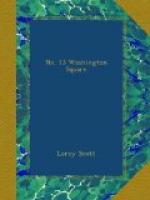“What news?”
“You will recall that the money with which I was to buy your letters of credit was money which I was to draw for you, to-day, as dividends on the stock you hold in the New York and New England Railroad.”
“Certainly—though I do not see the drift of your remarks.”
“And I hardly need remind you that the bulk of your fortune is invested in this railroad.”
“A perfectly good stock, I believe,” Mrs. De Peyster commented.
“Perfectly good—perfectly sound,” Judge Harvey agreed. “But there has existed a certain possibility in the company’s affairs for some time of which I hesitated to inform you. I did not wish to give you any unnecessary concern, which would have been the case if I had spoken to you and if the situation had terminated happily.”
“And what is the situation to which you refer?”
“You are doubtless aware that all the railroads have been complaining about bad business, owing to increased wages on the one side and governmental regulation of rates on the other. That’s the way the officers explain it; but the truth is, the roads have been abominably mismanaged.”
“Yes, I have vaguely heard something about bad business,” said Mrs. De Peyster with a bored air. “But what does all this lead to?”
“I am trying to lead you gently, Mrs. De Peyster, to realize the possibility that, in view of its alleged bad business, the New York and New England might decide to pass dividends for this quarter.”
Mrs. De Peyster started forward. “Do you mean to say, Judge Harvey, that such a possibility exists?”
“It’s rather more than a possibility.”
“More than a possibility?”
“Yes. In fact, it’s a—a fact.”
“A fact?”
“I have just come from the meeting of the directors. They have voted to pay no dividends.”
“No dividends!” Mrs. De Peyster gazed stupefied into the face of Judge Harvey. “No dividends! Then—then—my income?”
“I am very sorry,” said Judge Harvey.
Mrs. De Peyster sank back in her chair and laid one hand across her eyes. For a moment she was dazed by this undreamed-of disaster; so overwhelmed that she did not even hear Judge Harvey, whose anger had ere this begun to relax, try to reassure her with remarks about the company being perfectly solvent. But it was not befitting the De Peyster dignity to exhibit consternation. Instinct, habit, ruled. So, after a moment, she removed her hand, and, though all her senses were floundering, she remarked with an excellent imitation of calm:—
“Thank you very much, Judge Harvey, for your information.”
Judge Harvey, though still resentful, was by now feeling contrite for his share of their quarrel and looked unusually handsome in his contrition. And in his concern he could not help pointing the way out.
“I trust you have enough in your bank for your present plans. And if not, your bank will readily advance you what you need.”




